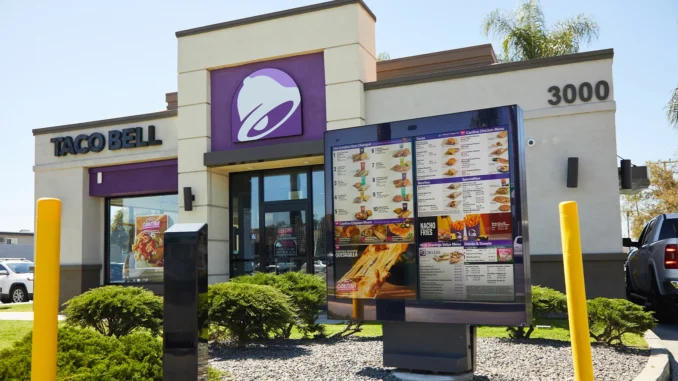
By Lea Mira, RTN staff writer - 8.8.2024
Taco Bell, the Mexican-inspired American fast-food chain, is making a technological leap by introducing artificial intelligence (AI) powered drive-thrus to hundreds of its US locations. This move, described as the company’s biggest change to date, follows a trial run in 100 stores across 13 states. The fast-food chain’s ultimate goal is to implement this technology in all its restaurants, signaling a strong belief in AI’s potential to revolutionize the customer experience.
According to a company press statement, the rollout of voice AI technology is designed “to enhance back-of-house operations for team members and elevate the order experience for consumers. Benefits include easing task load for team members, improving order accuracy, providing a consistent, friendly experience, and reducing wait times, while driving profitable growth for Taco Bell, Yum! Brands and their franchisees.”
This initiative comes on the heels of McDonald’s highly publicized, and ultimately unsuccessful, foray into AI drive-thrus. The fast-food giant ended its partnership with IBM earlier this year after widespread customer complaints and viral social media posts highlighting the system’s flaws, including inaccurate orders and unusual food combinations.
Despite McDonald’s challenges, Taco Bell remains confident in its AI-powered drive-thru system. Yum! Brands, Taco Bell’s parent company, asserts that their system, developed over two years of testing and refinement, has demonstrated improved order accuracy, increased employee satisfaction, and reduced wait times. However, the company has not yet released specific data to support these claims.
“Innovation is ingrained in our DNA at Taco Bell, and we view Voice AI as a means to improve the team member and consumer experiences,” said Dane Mathews, Chief Digital & Technology Officer, Taco Bell, in a press statement. “Tapping into AI gives us the ability to ease team members’ workloads, freeing them to focus on front-of-house hospitality. It also enables us to unlock new and meaningful ways to engage with our customers.”
In addition to the expansion of Voice AI across Taco Bell U.S. drive-thrus, five KFC restaurants in Australia are simultaneously testing Voice AI technology in drive-thrus. While Yum! Brands has not disclosed its technology partners in this endeavor, they have emphasized the system’s ability to comprehend diverse pronunciations of menu items, a direct response to past criticisms of similar technologies.
Additionally, the company assures that human employees will remain an integral part of the drive-thru experience, ready to assist if the AI encounters difficulties understanding an order. Addressing concerns about AI replacing human jobs, Yum! Brands Chief Innovation Officer Lawrence Kim stated that the technology is intended to “enhance the team member experience” by allowing them to focus on other tasks, rather than eliminating their roles.
Taco Bell is not alone in its pursuit of AI integration in the fast-food industry. Chipotle, Wingstop, and Panera are among several chains experimenting with AI applications. Notably, Del Taco abandoned its AI voicebot trial earlier this year after facing challenges.
Last month, Bojangles, the popular Southern cuisine fast-food chain, reported that it is expanding its deployment of a drive-thru voice AI technology. This move follows a successful pilot program at approximately 50 Bojangles restaurants and will encompass both company-owned and franchised locations, ultimately reaching hundreds of restaurants. The voice AI, known as “Bo-Linda” at Bojangles, is designed to streamline the drive-thru experience by automating order taking. The technology reportedly boasts a 95% accuracy rate, comparable to human employees, and aims to alleviate workload pressures on staff, allowing them to focus on food quality, order accuracy, and customer engagement.
Taco Bell’s AI drive-thru rollout comes amidst growing skepticism surrounding the rapid integration of AI into various sectors. Labor advocates have raised concerns about potential job displacement, and even industry leaders acknowledge the need for careful implementation. Despite these concerns, Yum! Brands remains committed to its “AI-first mentality,” with AI already playing a role in its restaurant management SuperApp. The company is also testing AI technology in five KFC locations in Australia, demonstrating a broader commitment to exploring AI’s potential across its portfolio of brands.
Taco Bell’s strategic utilization of technology has contributed in a big way to its recognition and marketing impact in recent years. Its digital channel witnessed a growth rate of nearly 35 percent last year, attributed in part to the deployment of in-store kiosks. These digital touchpoints have streamlined the ordering process. Thousands of its restaurants have also employed “recommended ordering,” an advanced system that predicts and suggests optimal quantities for each product, enabling restaurant general managers to make informed inventory decisions.
The brand has also spearheaded the rollout of Yum!’s Next-Generation Cloud First POS System—a technological innovation that enhances operational efficiency and empowers employees. This system was implemented in around 5,000 units last year. Also enhancing operational efficiency is Taco Bell’s Touch Kitchen Display System (Touch KDS), a technology that streamlines order prioritization and enhances accuracy. The technology has been rolled out to most of the company’s restaurant locations.
According to the company, the AI technology takes advantage of Taco Bell’s “strong drive-thru customer experience ecosystem, which is powered by digital menu boards, Yum! Brands’ propriety Poseidon POS system and the next generation of the Taco Bell Rewards loyalty program” which the brand is reportedly integrating later this year. Taco Bell’s innovation is also evident in other technology-enabled concepts. The Go Mobile restaurant model, for example, first introduced in 2021, eliminates indoor dining space to address drive-through bottlenecks. This concept features a dedicated parking area for mobile and delivery orders, an outdoor pick-up window, and grab-and-go shelves.
Whether Taco Bell’s AI drive-thrus will succeed where McDonald’s faltered remains to be seen. However, the company’s investment in this technology underscores the growing influence of AI in shaping the future of the fast-food industry and the customer experience.

